Page Summary
-
This guide explains how to use Google Mobile Ads SDK mediation to integrate ironSource Ads waterfall into a Unity app.
-
The guide covers setting up configurations in the ironSource Ads UI, including adding a new app and creating ad instances.
-
It details how to import the ironSource Ads SDK and adapter into your Unity project using OpenUPM-CLI, OpenUPM, or a Unity Package.
-
The guide outlines important privacy considerations, including complying with EU consent and US state privacy laws.
-
It provides steps for testing your implementation by enabling test ads and verifying them using the ad inspector.
This guide shows you how to use Google Mobile Ads Unity Plugin to load and display ads from ironSource Ads using mediation, covering waterfall integrations. It covers how to add ironSource Ads to an ad unit's mediation configuration, and how to integrate the ironSource Ads SDK and adapter into a Unity app.
Supported integrations and ad formats
The Ad Manager mediation adapter for ironSource Ads has the following capabilities:
| Integration | |
|---|---|
| Bidding | |
| Waterfall | |
| Formats | |
| Banner | |
| Interstitial | |
| Rewarded | |
| Rewarded Interstitial | 1 |
1 This format is only supported in waterfall integration.
Requirements
- Latest Google Mobile Ads Unity Plugin
- Unity 4 or higher
- [For bidding]: To integrate all supported ad formats in bidding, use Google Mobile Ads mediation plugin for IronSource 3.5.1 or higher (latest version recommended)
- To deploy on Android
- Android API level 23 or higher
- To deploy on iOS
- iOS deployment target of 13.0 or higher
- A working Unity project configured with Google Mobile Ads Unity Plugin. See Set up Google Mobile Ads Unity Plugin for details.
- Set up mediation
Step 1: Set up configurations in ironSource Ads UI
Sign up and sign in to your ironSource Ads account.
Add a new app
To add a new app, navigate to Ads > Apps and click Add app.
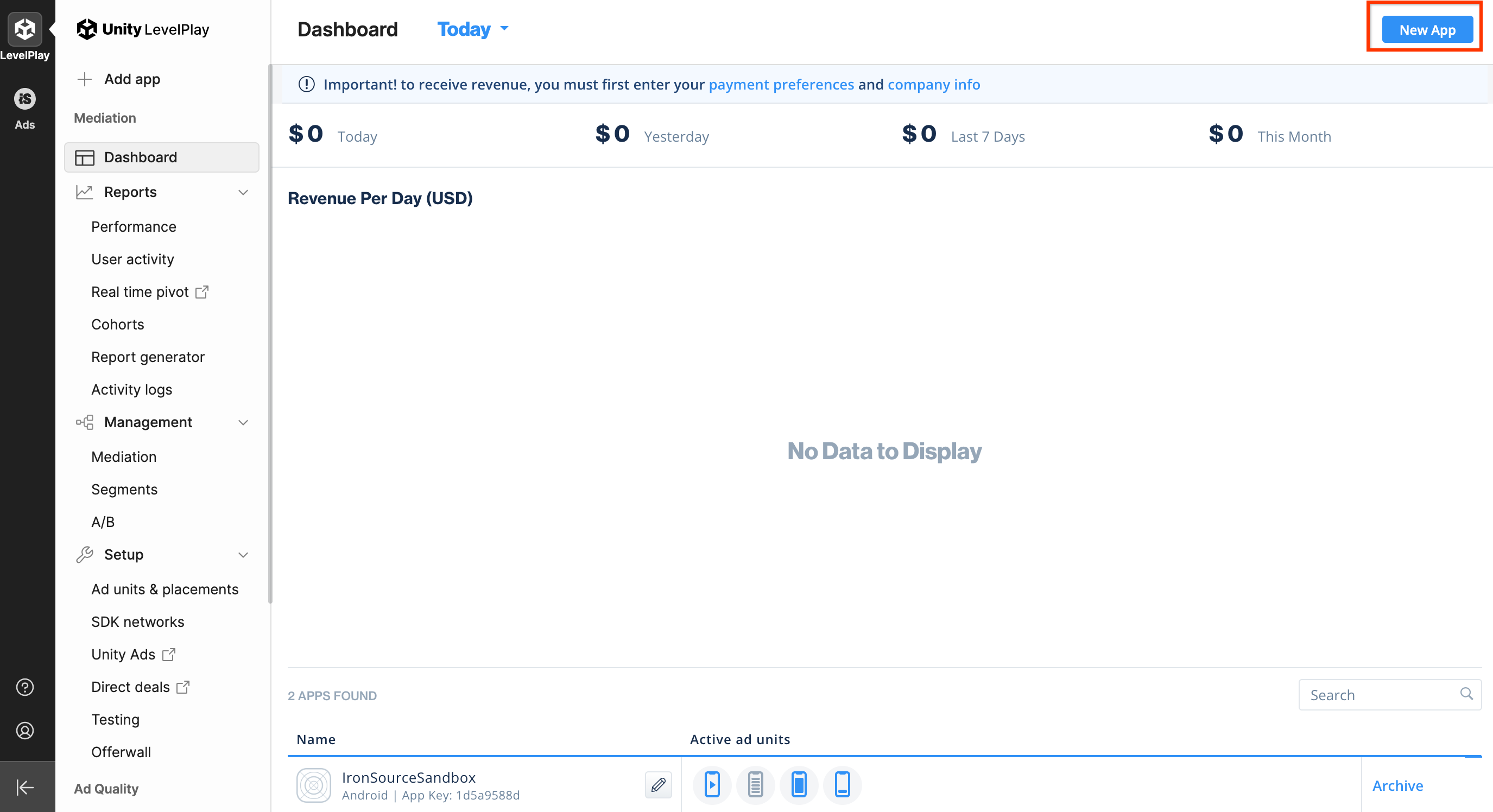
Fill out the form and click Add app.
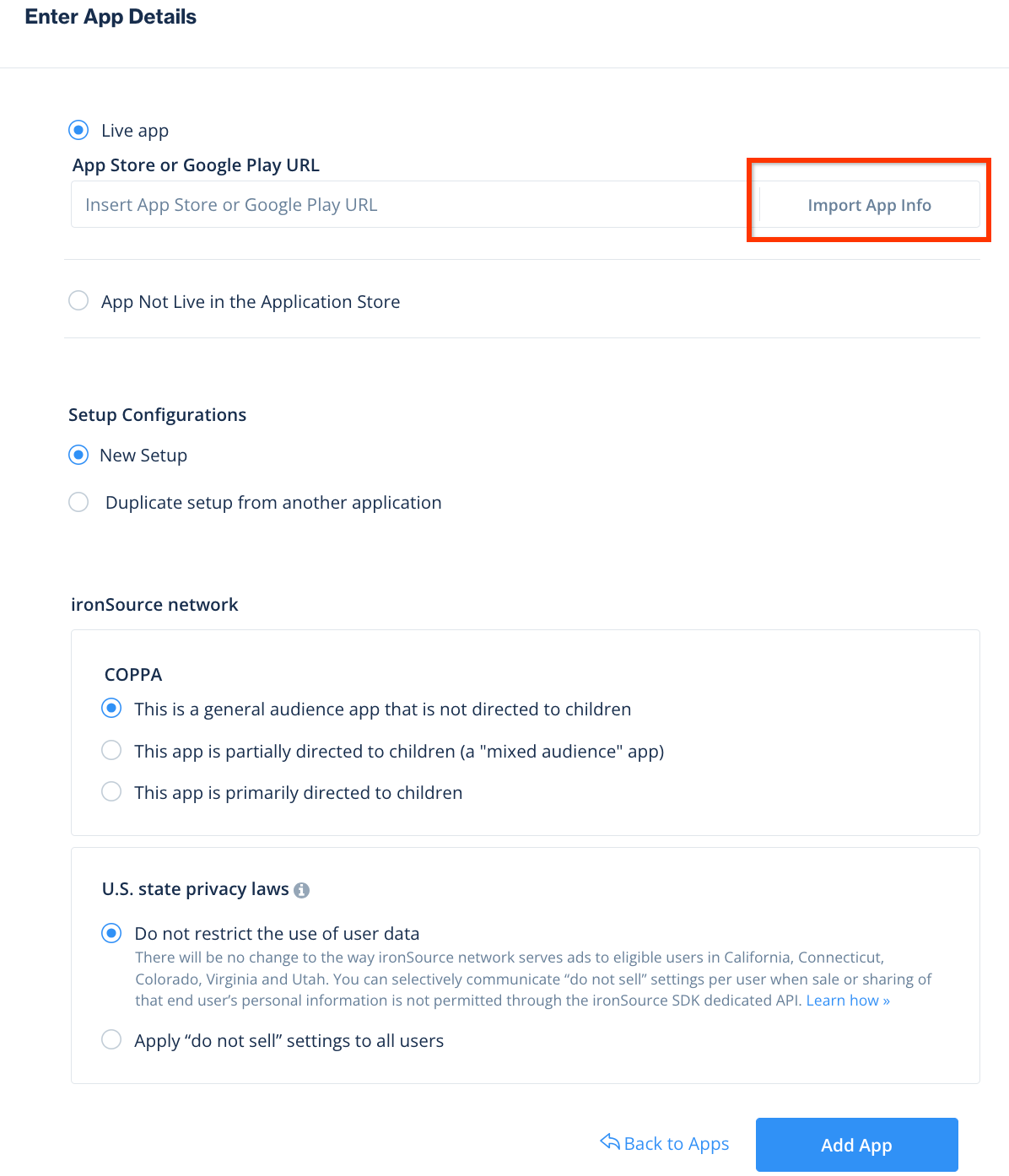
Take note of the App Key, then select the ad formats your app supports and click Continue.
Android
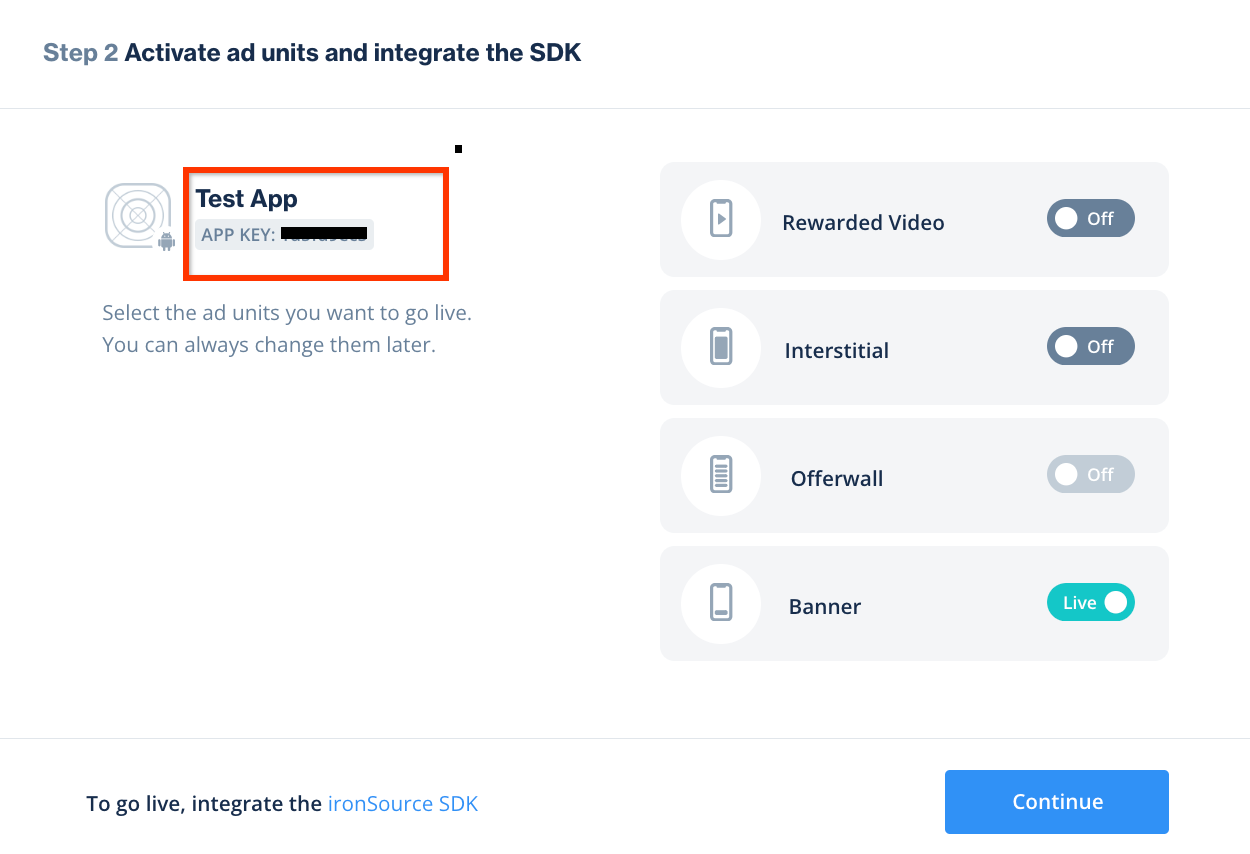
iOS
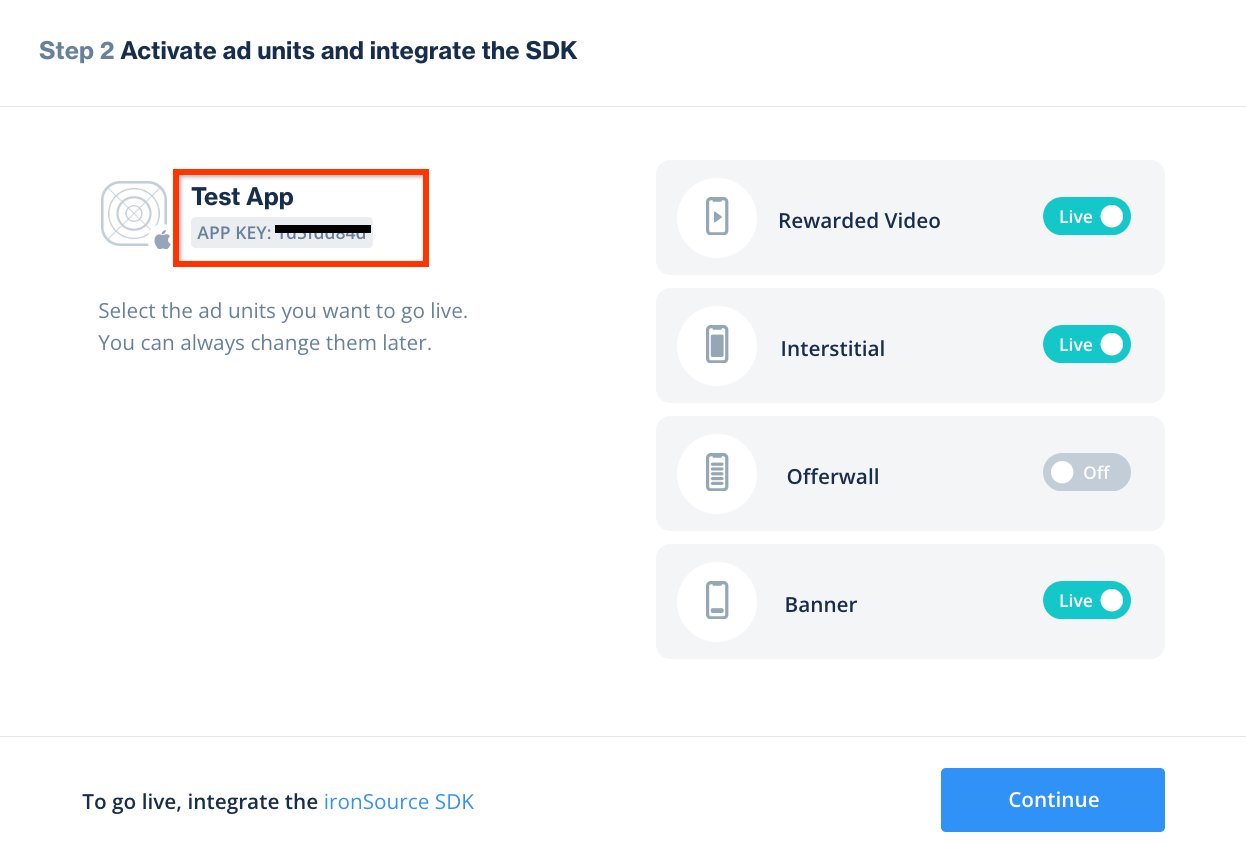
Create an instance
Next, configure an instance for the app you added.
Navigate to Ads > Setup > Instances. Select the app and click Create instance.

Bidding
Fill out the form and select Bidding for Pricing. Click Save and close.
Android
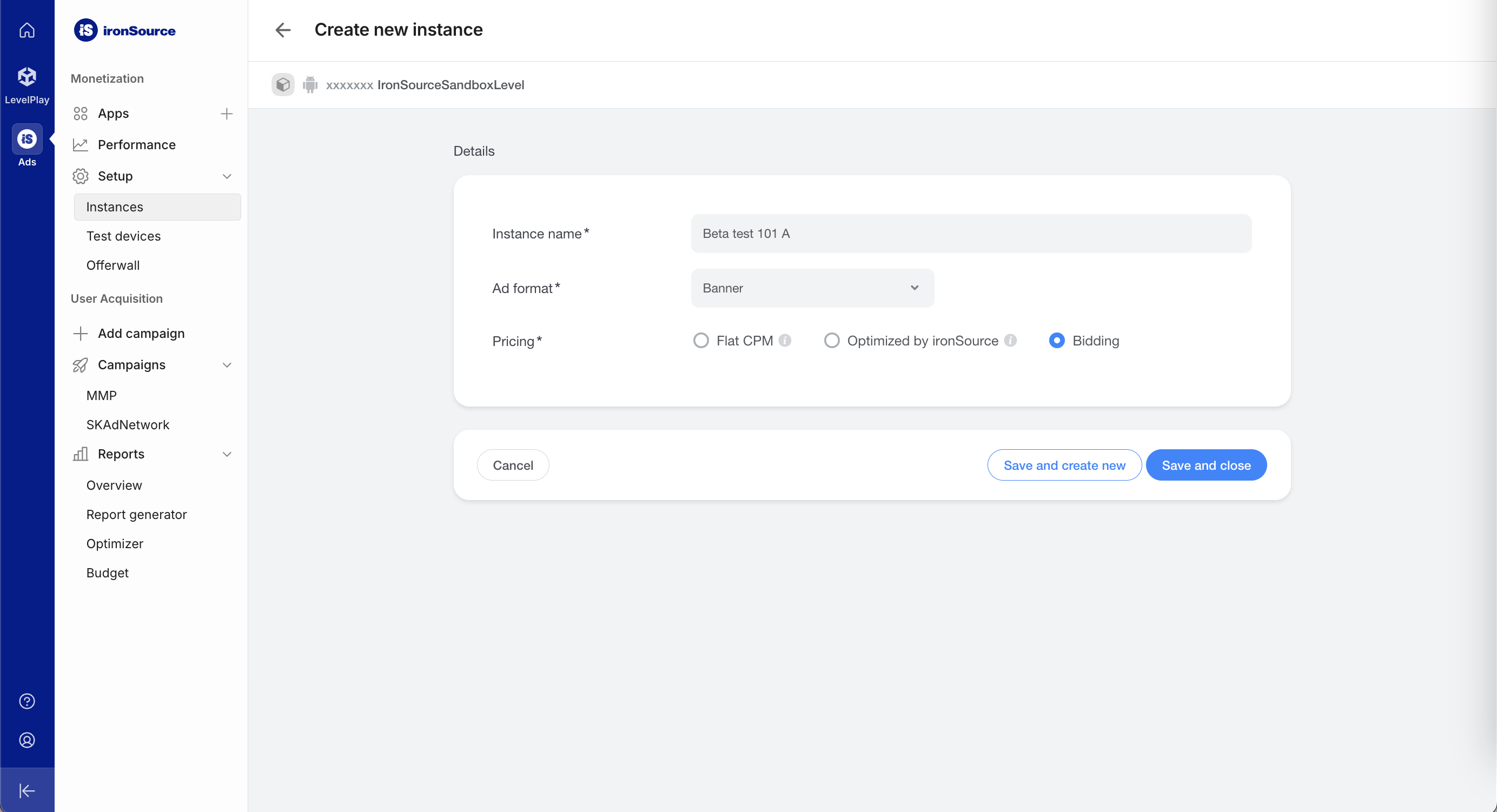
iOS
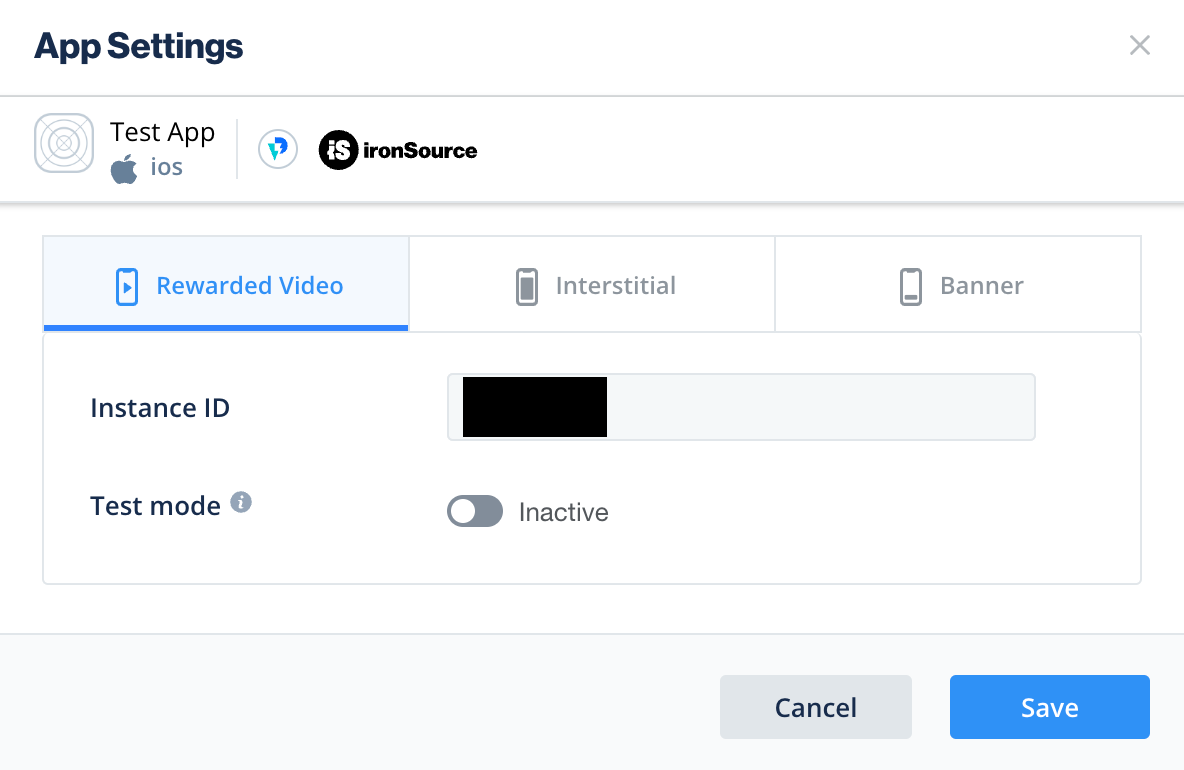
Take note of the Instance ID.
Android
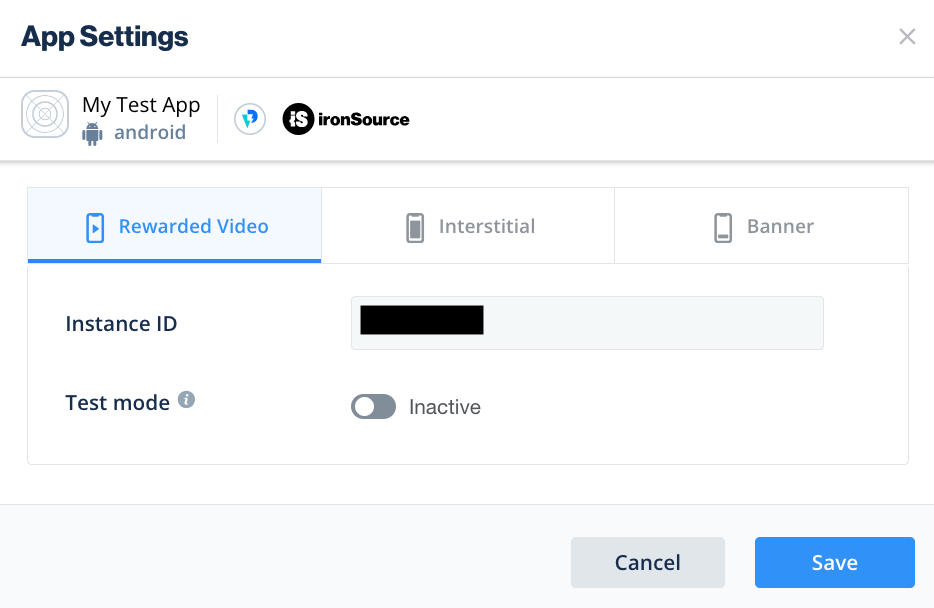
iOS

Waterfall
Fill out the form and click Save and close.
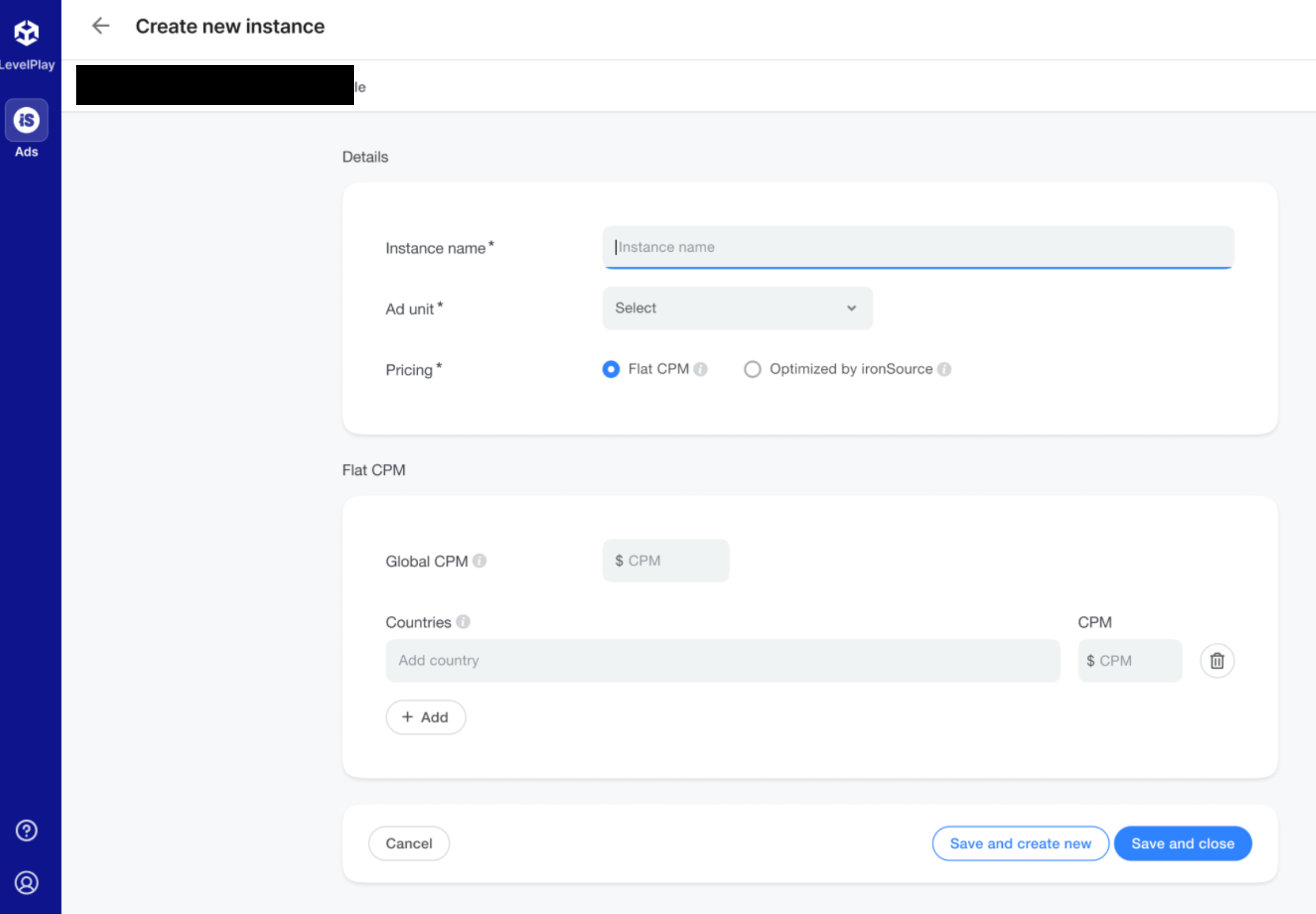
Take note of the Instance ID.

Locate your Reporting API Key
Bidding
This step isn't required for bidding integrations.
Waterfall
Click the API tab in My Account page and take note of your Secret Key and Refresh Token.
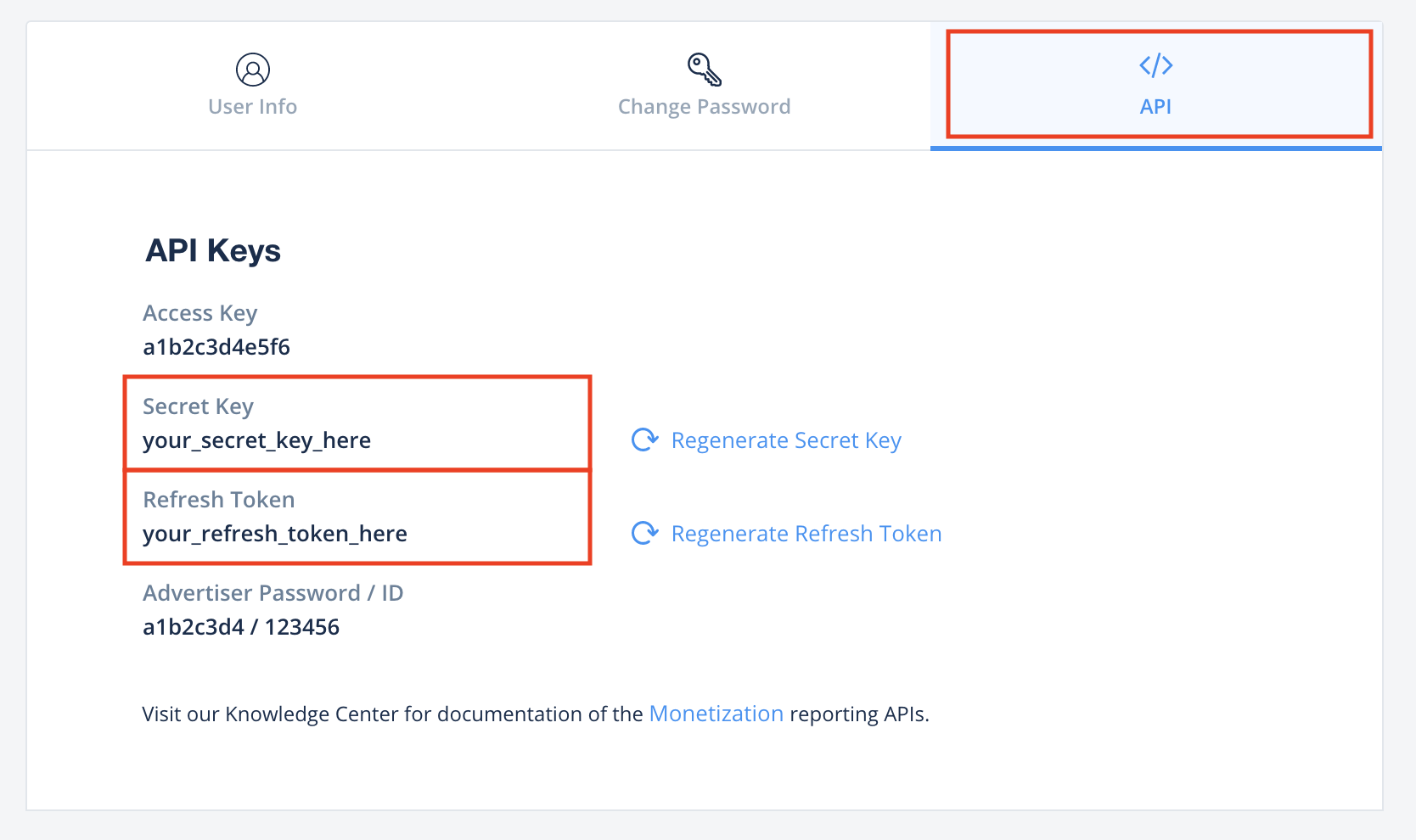
Update your app-ads.txt
Authorized Sellers for Apps app-ads.txt is an IAB Tech Lab initiative that helps ensure your
app ad inventory is only sold through channels you've identified as authorized. To prevent a
significant loss in ad revenue, you'll need to implement an app-ads.txt file.
If you haven't done so already,
create an app-ads.txt file for Ad Manager.
To implement app-ads.txt for ironSource, see
ironSource authorized resellers.
Turn on test mode
Follow the instructions in ironSource Ads's Integration testing guide on how to enable ironSource Ads test ads.
Step 2: Set up ironSource Ads demand in Ad Manager UI
Configure mediation settings for your ad unit
Android
For instructions, see step 2 in the guide for Android.
iOS
For instructions, see step 2 in the guide for iOS.
Add ironSource Mobile to GDPR and US state regulations ad partners list
Follow the steps in European regulations settings and US state regulations settings to add ironSource Mobile to the European and US state regulations ad partners list in the Ad Manager UI.
Step 3: Import the ironSource Ads SDK and adapter
OpenUPM-CLI
If you have OpenUPM-CLI installed, you can install the Google Mobile Ads ironSource Ads Mediation Plugin for Unity to your project by running the following command from your project's root directory:
openupm add com.google.ads.mobile.mediation.ironsourceOpenUPM
In your Unity project editor, select Edit > Project Settings > Package Manager to open the Unity Package Manager Settings.
Under the Scoped Registries tab, add OpenUPM as a scoped registry with the following details:
- Name:
OpenUPM - URL:
https://package.openupm.com - Scope(s):
com.google
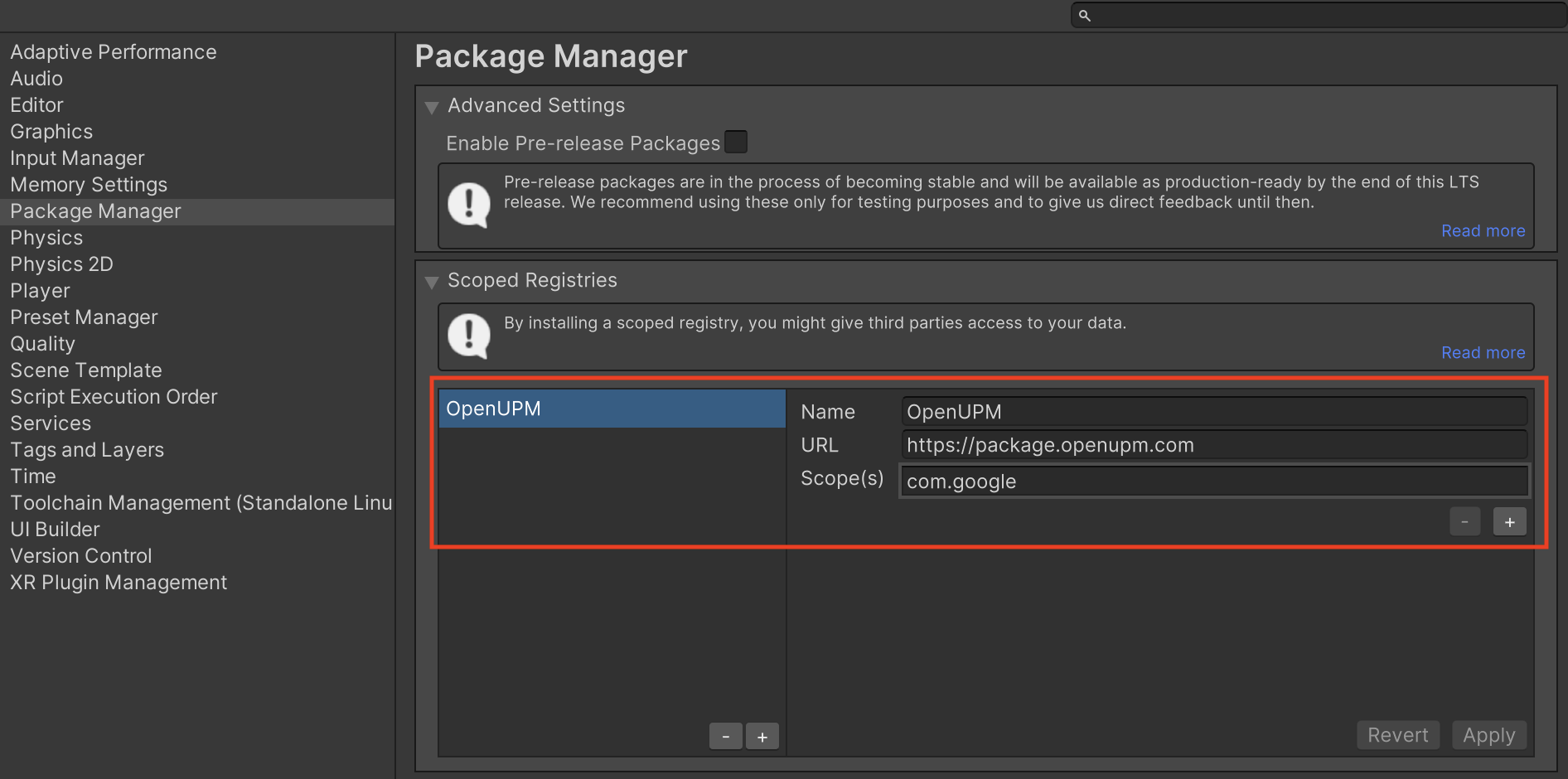
Then, navigate to Window > Package Manager to open the Unity Package Manager and select My Registries from the drop-down menu.
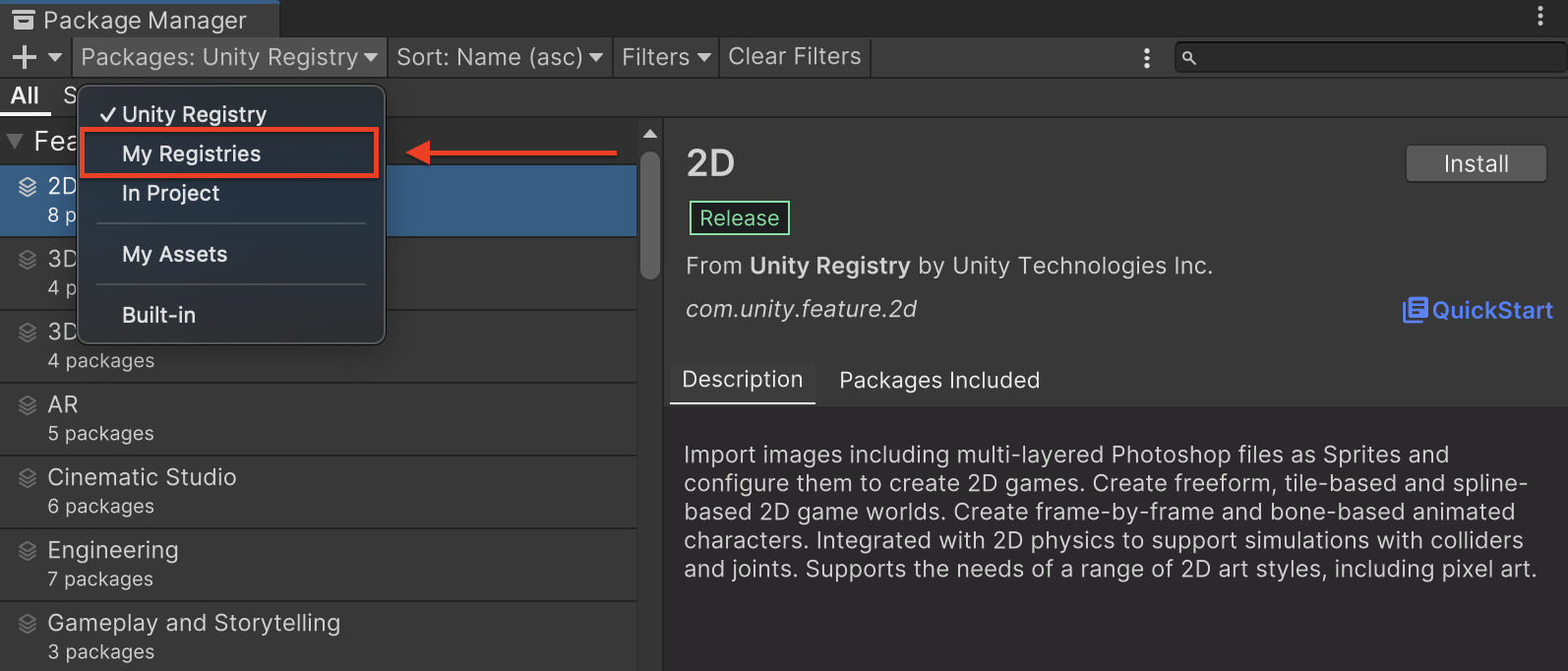
Select the Google Mobile Ads IronSource Mediation package and click Install.
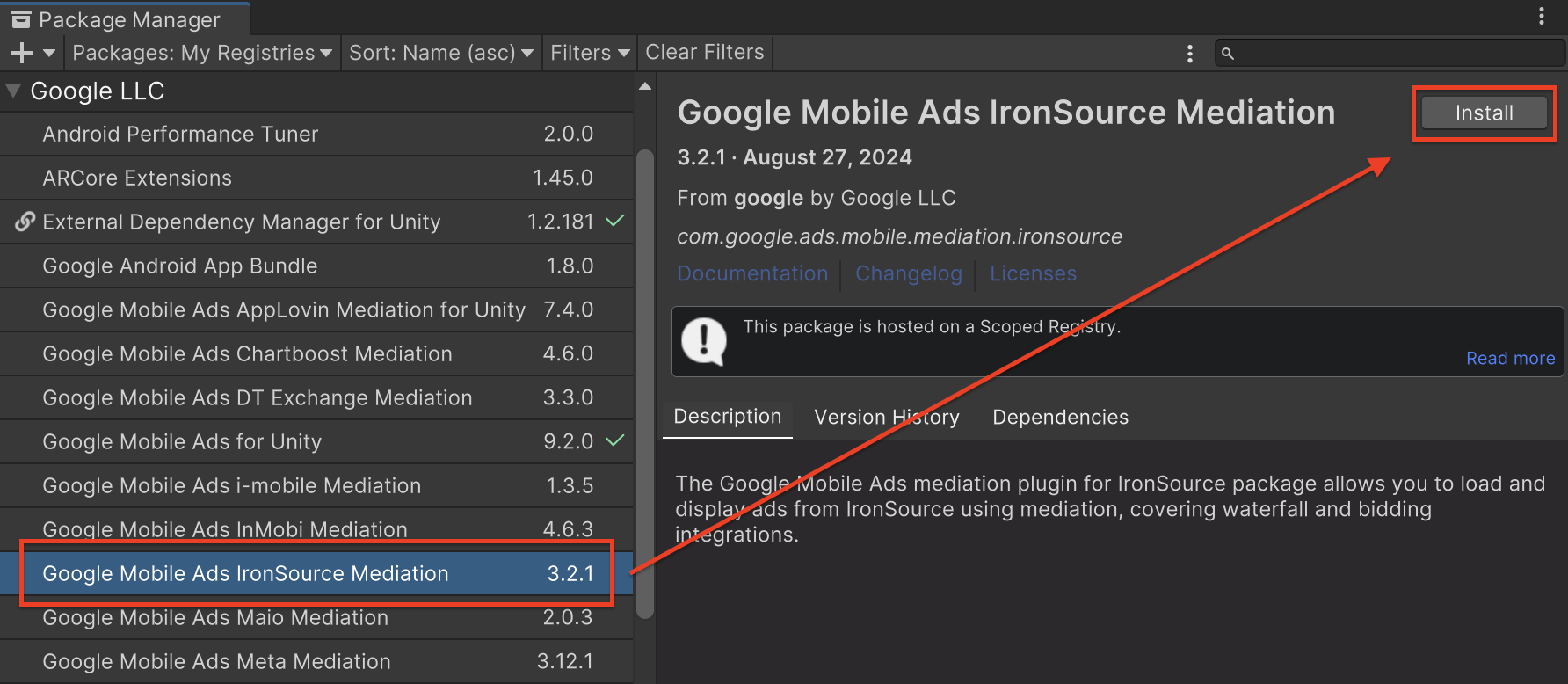
Unity Package
Download the latest version of Google Mobile Ads mediation plugin for
ironSource Ads from the download link in
the
Changelog
and extract the
GoogleMobileAdsIronSourceMediation.unitypackage from the zip
file.
In your Unity project editor, select Assets > Import Package >
Custom Package and find the
GoogleMobileAdsIronSourceMediation.unitypackage
file you downloaded. Make sure that all the files are selected and click
Import.
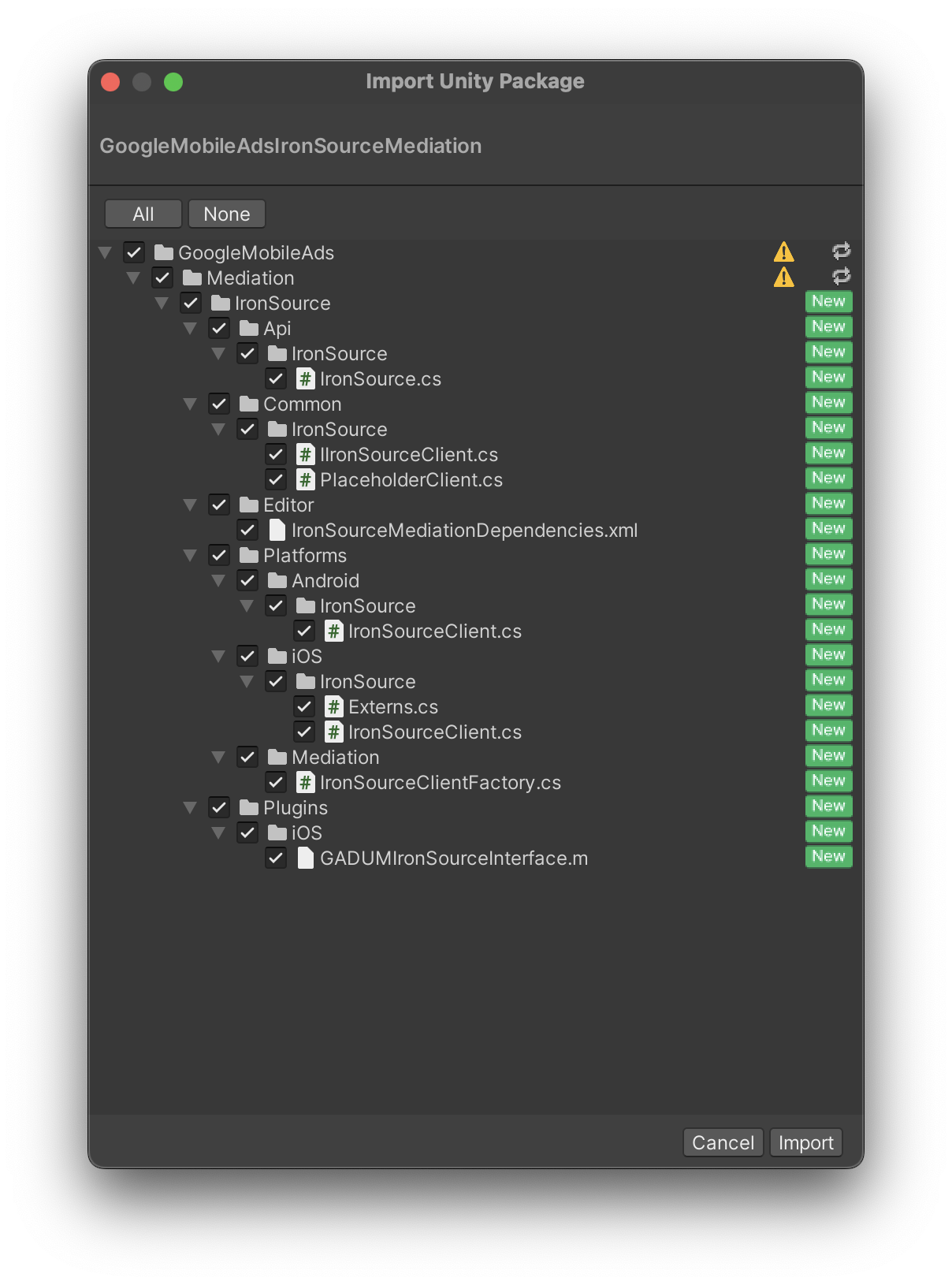
Then, select Assets > External Dependency Manager >
Android Resolver > Force Resolve. The External Dependency Manager
library will perform dependency resolution from scratch and copy the
declared dependencies into the Assets/Plugins/Android directory of your
Unity app.
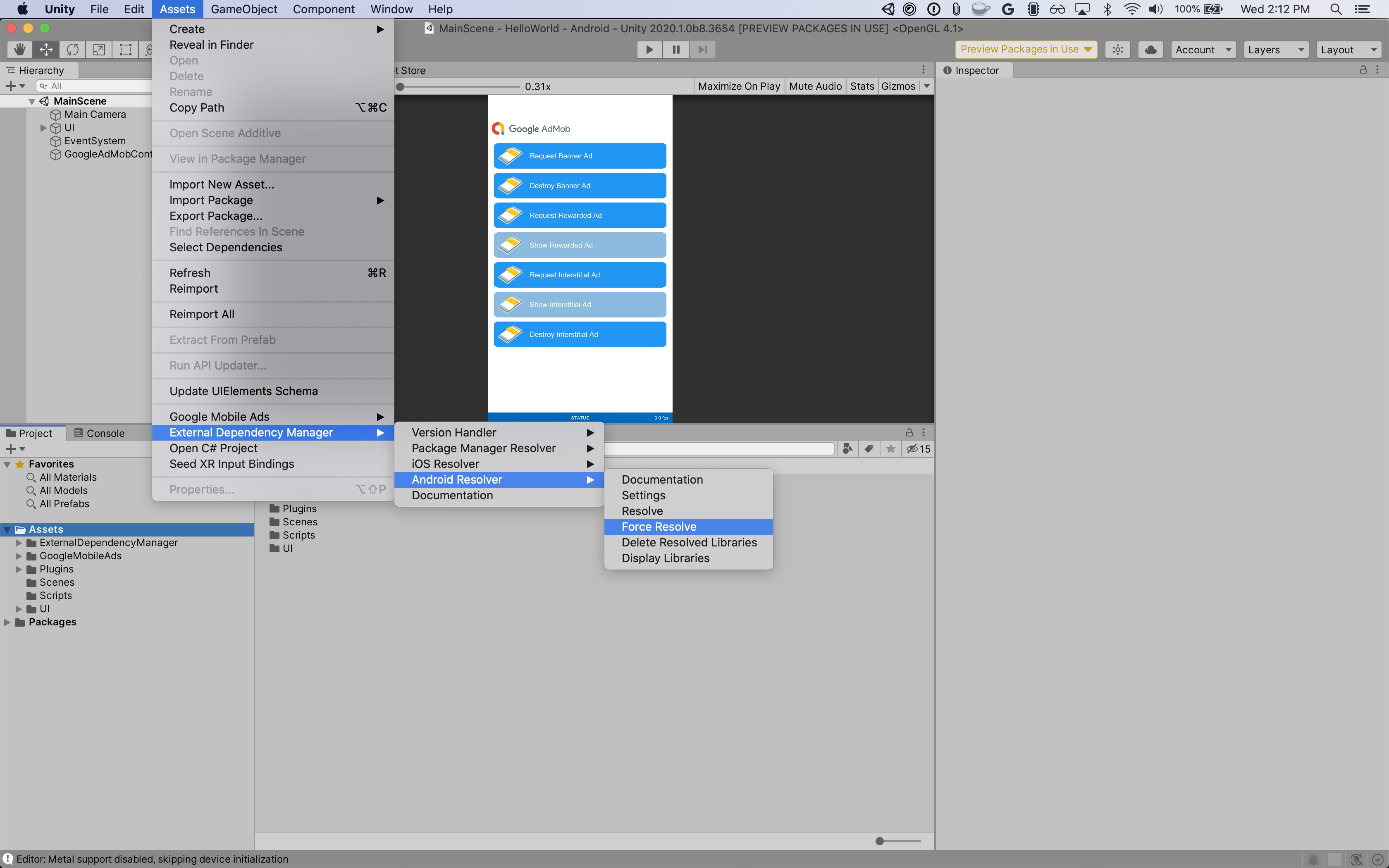
Step 4: Implement privacy settings on ironSource Ads SDK
EU Consent and GDPR
To comply with Google EU User Consent Policy, you must make certain disclosures to your users in the European Economic Area (EEA), the UK, and Switzerland, and obtain their consent for the use of cookies or other local storage where legally required, and for the collection, sharing, and use of personal data for ads personalization. This policy reflects the requirements of the EU ePrivacy Directive and the General Data Protection Regulation (GDPR). You are responsible for verifying consent is propagated to each ad source in your mediation chain. Google is unable to pass the user's consent choice to such networks automatically.
Starting in the ironSource adapter Unity plugin version 2.6.0, ironSource automatically reads GDPR consent set by consent management platforms that support Google's Additional Consent specification, including the UMP SDK. For more information, see Support for Google UMP and CMPs that support Google's Additional Consent.
US state privacy laws
US states privacy laws require giving users the right to opt out of the "sale" of their "personal information" (as the law defines those terms), with the opt-out offered through a prominent "Do Not Sell My Personal Information" link on the "selling" party's homepage. The US states privacy laws compliance guide offers the ability to enable restricted data processing for Google ad serving, but Google is unable to apply this setting to each ad network in your mediation chain. Therefore, you must identify each ad network in your mediation chain that may participate in the sale of personal information and follow guidance from each of those networks to ensure compliance.
The Google Mobile Ads mediation plugin for ironSource Ads
version 2.2.4
includes the
IronSource.SetMetaData()
method. The following sample code shows how to pass
consent information to the ironSource Ads SDK. These options must be set before
you initialize the Google Mobile Ads
SDK
to ensure they get forwarded properly to the ironSource Ads SDK.
using GoogleMobileAds.Api.Mediation.IronSource;
// ...
IronSource.SetMetaData("do_not_sell", "true");
See ironSource Ads's documentation on Regulation Advanced Settings for both Android and iOS for more details and the values that can be provided in the method.
Step 5: Add required code
Android
Proguard Rules
If you shrink, obfuscate, and optimize your app, IronSource Ads requires additional ProGuard rules for your project.
When building your project, select Android as the Platform. Then,
open Player Settings and check User Proguard File under the
Publishing Settings tab. Unity should show where a custom
proguard-user.txt file was created for you to modify.
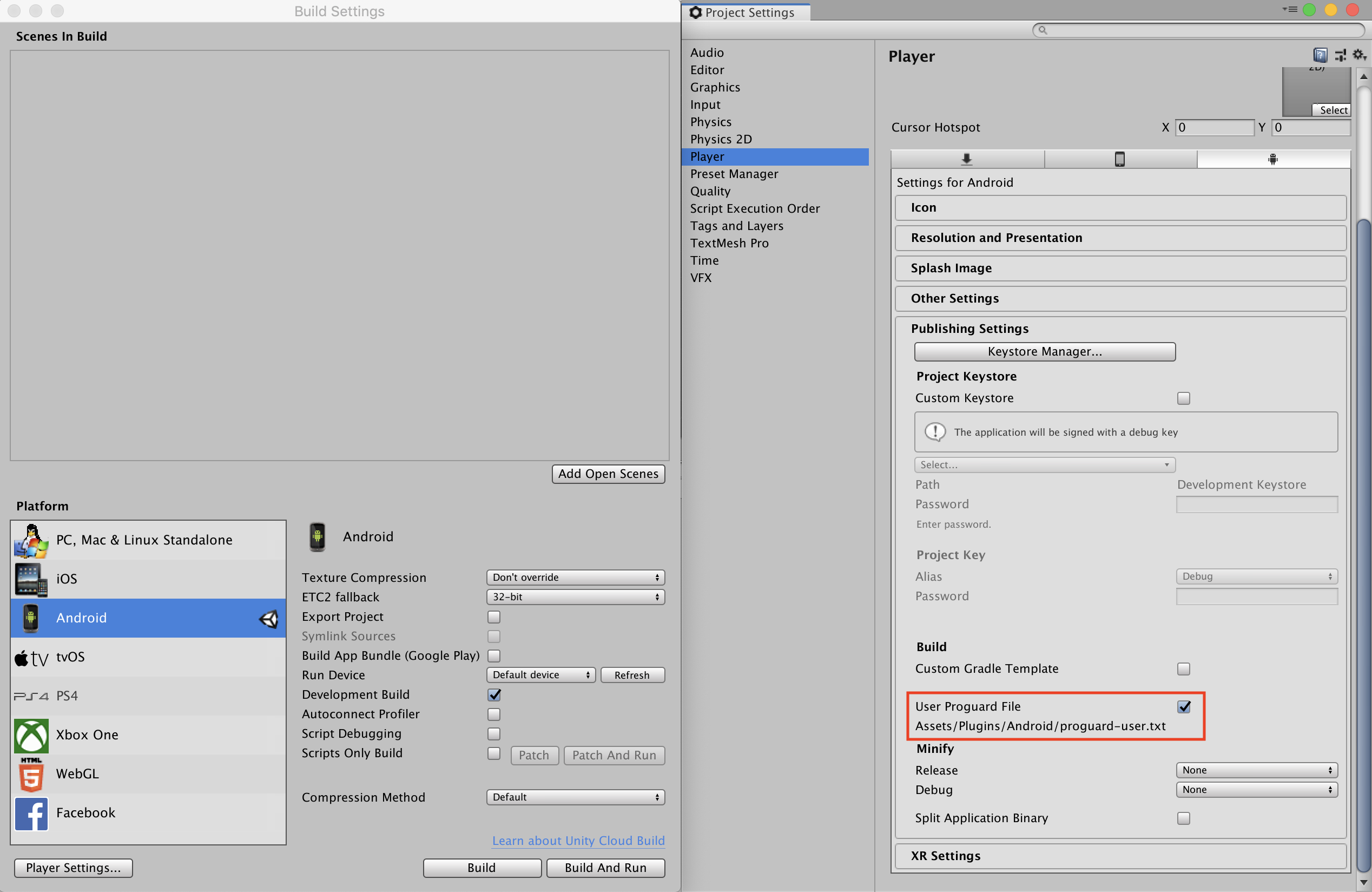
Consult
IronSource Ads's Android SDK Integration guide
for more information on what ProGuard rules are required for your project,
and add those rules to your proguard-user.txt file.
iOS
SKAdNetwork integration
Follow ironSource Ads's documentation to add the SKAdNetwork identifiers to your
project's Info.plist file.
Step 6: Test your implementation
Enable test ads
Make sure you register your test device for Ad Manager and enable test mode in ironSource Ads UI.
Verify test ads
To verify that you are receiving test ads from ironSource Ads, enable single ad source testing in ad inspector using the ironSource Ads (Bidding) and ironSource Ads (Waterfall) ad source(s).
Error codes
If the adapter fails to receive an ad from ironSource Ads, publishers can check
the underlying error from the ad response using
ResponseInfo under the
following classes:
Android
com.google.ads.mediation.ironsource.IronSourceAdapter
com.google.ads.mediation.ironsource.IronSourceRewardedAdapter
iOS
GADMAdapterIronSource
GADMAdapterIronSourceRewarded
Here are the codes and accompanying messages thrown by the ironSource Ads adapter when an ad fails to load:
Android
| Error code | Reason |
|---|---|
| 101 | ironSource Ads server parameters configured in the Ad Manager UI are missing/invalid. |
| 102 | ironSource Ads requires an Activity context to initialize their SDK. |
| 103 | ironSource Ads can only load 1 ad per ironSource instance ID. |
| 105 | The requested banner ad size is not supported by ironSource Ads. |
| 106 | ironSource Ads SDK is not initialized. |
| 501-1056 | ironSource Ads SDK Errors. See documentation for more details. |
iOS
| Error code | Reason |
|---|---|
| 101 | ironSource Ads server parameters configured in the Ad Manager UI are missing/invalid. |
| 102 | ironSource Ads Adapter does not support the ad format being requested. |
| 103 | An ironSource ad is already loaded for this network configuration. |
| 104 | The requested banner ad size is not supported by ironSource Ads. |
| 508-1037 | ironSource Ads SDK Errors. See documentation for more details. |
IronSource Unity Mediation Plugin Changelog
Version 4.3.0
- Supports IronSource Android adapter version 9.3.0.0.
- Supports IronSource iOS adapter version 9.2.0.0.0.
- Built and tested with the Google Mobile Ads Unity Plugin version 10.7.0.
Version 4.2.0
- Supports IronSource Android adapter version 9.2.0.0.
- Supports IronSource iOS adapter version 9.2.0.0.0.
- Built and tested with the Google Mobile Ads Unity Plugin version 10.6.0.
Version 4.1.0
- Supports IronSource Android adapter version 9.1.0.0.
- Supports IronSource iOS adapter version 9.1.0.0.0.
- Built and tested with the Google Mobile Ads Unity Plugin version 10.6.0.
Version 4.0.0
- Supports IronSource Android adapter version 9.0.0.1.
- Supports IronSource iOS adapter version 9.0.0.0.0.
- Built and tested with the Google Mobile Ads Unity Plugin version 10.5.0.
Version 3.11.1
- Supports IronSource Android adapter version 8.11.1.0.
- Supports IronSource iOS adapter version 8.11.0.0.0.
- Built and tested with the Google Mobile Ads Unity Plugin version 10.4.2.
Version 3.11.0
- Supports IronSource Android adapter version 8.11.0.0.
- Supports IronSource iOS adapter version 8.11.0.0.0.
- Built and tested with the Google Mobile Ads Unity Plugin version 10.4.2.
Version 3.10.0
- Supports IronSource Android adapter version 8.10.0.0.
- Supports IronSource iOS adapter version 8.10.0.0.0.
- Built and tested with the Google Mobile Ads Unity Plugin version 10.3.0.
Version 3.9.1
- Supports IronSource Android adapter version 8.9.1.0.
- Supports IronSource iOS adapter version 8.9.1.0.0.
- Built and tested with the Google Mobile Ads Unity Plugin version 10.2.0.
Version 3.9.0
- Supports IronSource Android adapter version 8.9.0.0.
- Supports IronSource iOS adapter version 8.9.0.0.0.
- Built and tested with the Google Mobile Ads Unity Plugin version 10.2.0.
Version 3.8.1
- Supports IronSource Android adapter version 8.8.0.1.
- Supports IronSource iOS adapter version 8.8.0.0.0.
- Built and tested with the Google Mobile Ads Unity Plugin version 10.2.0.
Version 3.8.0
- Supports IronSource Android adapter version 8.8.0.0.
- Supports IronSource iOS adapter version 8.8.0.0.0.
- Built and tested with the Google Mobile Ads Unity Plugin version 10.0.0.
Version 3.7.0
- Supports IronSource Android adapter version 8.7.0.1.
- Supports IronSource iOS adapter version 8.7.0.0.0.
- Built and tested with the Google Mobile Ads Unity Plugin version 10.0.0.
Version 3.6.1
- Supports IronSource Android adapter version 8.6.1.0.
- Supports IronSource iOS adapter version 8.6.0.0.0.
- Built and tested with the Google Mobile Ads Unity Plugin version 9.5.0.
Version 3.6.0
- Supports IronSource Android adapter version 8.6.0.0.
- Supports IronSource iOS adapter version 8.6.0.0.0.
- Built and tested with the Google Mobile Ads Unity Plugin version 9.5.0.
Version 3.5.2
- Supports IronSource Android adapter version 8.5.0.1.
- Supports IronSource iOS adapter version 8.5.1.0.0.
- Built and tested with the Google Mobile Ads Unity Plugin version 9.5.0.
Version 3.5.1
- Supports IronSource Android adapter version 8.5.0.1.
- Supports IronSource iOS adapter version 8.5.0.0.1.
- Built and tested with the Google Mobile Ads Unity Plugin version 9.5.0.
Version 3.5.0
- Supports IronSource Android adapter version 8.5.0.0.
- Supports IronSource iOS adapter version 8.5.0.0.0.
- Built and tested with the Google Mobile Ads Unity Plugin version 9.4.0.
Version 3.4.0
- Supports IronSource Android adapter version 8.4.0.0.
- Supports IronSource iOS adapter version 8.4.0.0.0.
- Built and tested with the Google Mobile Ads Unity Plugin version 9.2.1.
Version 3.3.1
- Supports IronSource Android adapter version 8.3.0.0.
- Supports IronSource iOS adapter version 8.3.0.0.1.
- Built and tested with the Google Mobile Ads Unity Plugin version 9.2.0.
Version 3.3.0
- Supports IronSource Android adapter version 8.3.0.0.
- Supports IronSource iOS adapter version 8.3.0.0.0.
- Built and tested with the Google Mobile Ads Unity Plugin version 9.2.0.
Version 3.2.1
- Renamed
DummyClienttoPlaceholderClient. - Supports IronSource Android adapter version 8.2.1.0.
- Supports IronSource iOS adapter version 8.2.0.0.0.
- Built and tested with the Google Mobile Ads Unity Plugin version 9.2.0.
Version 3.2.0
- Supports IronSource Android adapter version 8.2.0.0.
- Supports IronSource iOS adapter version 8.2.0.0.0.
- Built and tested with the Google Mobile Ads Unity Plugin version 9.1.1.
Version 3.1.1
- Supports IronSource Android adapter version 8.1.0.0.
- Supports IronSource iOS adapter version 8.1.1.0.0.
- Built and tested with the Google Mobile Ads Unity Plugin version 9.1.1.
Version 3.1.0
- Supports IronSource Android adapter version 8.1.0.0.
- Supports IronSource iOS adapter version 8.1.0.0.1.
- Built and tested with the Google Mobile Ads Unity Plugin version 9.1.0.
Version 3.0.1
- Supports IronSource Android adapter version 8.0.0.1.
- Supports IronSource iOS adapter version 8.0.0.0.1.
- Built and tested with the Google Mobile Ads Unity Plugin version 9.1.0.
Version 3.0.0
- Supports IronSource Android adapter version 8.0.0.0.
- Supports IronSource iOS adapter version 8.0.0.0.0.
- Built and tested with the Google Mobile Ads Unity Plugin version 9.0.0.
Version 2.6.1
- Supports IronSource Android adapter version 7.9.0.0.
- Supports IronSource iOS adapter version 7.9.1.0.0.
- Built and tested with the Google Mobile Ads Unity Plugin version 9.0.0.
Version 2.6.0
- Supports IronSource Android adapter version 7.9.0.0.
- Supports IronSource iOS adapter version 7.9.0.0.0.
- Built and tested with the Google Mobile Ads Unity Plugin version 9.0.0.
Version 2.5.0
- Supports IronSource Android adapter version 7.6.0.0.
- Supports IronSource iOS adapter version 7.6.0.0.
- Built and tested with the Google Mobile Ads Unity Plugin version 8.6.0.
Version 2.4.0
- Supports IronSource Android adapter version 7.5.2.0.
- Supports IronSource iOS adapter version 7.5.1.0.
- Built and tested with the Google Mobile Ads Unity Plugin version 8.6.0.
Version 2.3.1
- Supports IronSource Android adapter version 7.3.1.0.
- Supports IronSource iOS adapter version 7.3.1.0.0.
- Built and tested with the Google Mobile Ads Unity Plugin version 8.3.0.
Version 2.3.0
- Moved adapter content to
GoogleMobileAds/Mediation/IronSource/. - Refactored adapter namespace to use
GoogleMobileAds.Mediation.IronSource. - Supports IronSource Android adapter version 7.3.0.1.0.
- Supports IronSource iOS adapter version 7.3.0.0.0.
- Built and tested with the Google Mobile Ads Unity Plugin version 8.1.0.
Version 2.2.7
- Supports IronSource Android adapter version 7.2.7.0.
- Supports IronSource iOS adapter version 7.2.7.0.1.
- Built and tested with the Google Mobile Ads Unity Plugin version 7.4.1.
Version 2.2.6
- Supports IronSource Android adapter version 7.2.6.0.
- Supports IronSource iOS adapter version 7.2.6.0.0.
- Built and tested with the Google Mobile Ads Unity Plugin version 7.3.1.
Version 2.2.5
- Supports IronSource Android adapter version 7.2.5.0.
- Supports IronSource iOS adapter version 7.2.5.1.0.
- Built and tested with the Google Mobile Ads Unity Plugin version 7.3.0.
Version 2.2.4
- Added the
IronSource.SetMetaData(string, string)method. - Supports IronSource Android adapter version 7.2.3.1.0.
- Supports IronSource iOS adapter version 7.2.4.0.
- Built and tested with the Google Mobile Ads Unity Plugin version 7.2.0.
Version 2.2.3
- Supports IronSource Android adapter version 7.2.3.1.0.
- Supports IronSource iOS adapter version 7.2.3.1.0.
- Built and tested with the Google Mobile Ads Unity Plugin version 7.1.0.
Version 2.2.2
- Supports IronSource Android adapter version 7.2.2.1.0.
- Supports IronSource iOS adapter version 7.2.2.1.0.
- Built and tested with the Google Mobile Ads Unity Plugin version 7.0.2.
Version 2.2.1
- Supports IronSource Android adapter version 7.2.1.1.0.
- Supports IronSource iOS adapter version 7.2.1.2.0.
- Built and tested with the Google Mobile Ads Unity Plugin version 7.0.0.
Version 2.2.0
- Supports IronSource Android adapter version 7.2.1.0.
- Supports IronSource iOS adapter version 7.2.1.0.
- Built and tested with the Google Mobile Ads Unity Plugin version 7.0.0.
Version 2.1.5
- Supports IronSource Android adapter version 7.1.14.0.
- Supports IronSource iOS adapter version 7.1.14.0.
Version 2.1.4
- Supports IronSource Android adapter version 7.1.13.0.
- Supports IronSource iOS adapter version 7.1.13.0.
Version 2.1.3
- Supports IronSource Android adapter version 7.1.12.0.
- Supports IronSource iOS adapter version 7.1.12.0.
Version 2.1.2
- Supports IronSource Android adapter version 7.1.11.1.0.
- Supports IronSource iOS adapter version 7.1.11.1.0.
Version 2.1.1
- Supports IronSource Android adapter version 7.1.8.0.
- Supports IronSource iOS adapter version 7.1.8.0.
Version 2.1.0
- Supports IronSource Android adapter version 7.1.6.0.
- Supports IronSource iOS adapter version 7.1.6.1.0.
Version 2.0.3
- Supports IronSource Android adapter version 7.0.3.1.0.
- Supports IronSource iOS adapter version 7.0.3.0.
Version 2.0.2
- Supports IronSource Android adapter version 7.0.2.0.
- Supports IronSource iOS adapter version 7.0.2.0.
Version 2.0.1
- Supports IronSource Android adapter version 7.0.1.1.0.
- Supports IronSource iOS adapter version 7.0.1.0.
Version 2.0.0
- Supports IronSource Android adapter version 7.0.0.0.
- Supports IronSource iOS adapter version 7.0.0.0.
Version 1.10.0
- Supports IronSource Android adapter version 6.18.0.0.
- Supports IronSource iOS adapter version 6.18.0.0.
Version 1.9.1
- Supports IronSource Android adapter version 6.17.0.1.
- Supports IronSource iOS adapter version 6.17.0.1.0.
Version 1.9.0
- Supports IronSource Android adapter version 6.17.0.0.
- Supports IronSource iOS adapter version 6.16.3.0.
Version 1.8.2
- Supports IronSource Android adapter version 6.16.2.0.
- Supports IronSource iOS adapter version 6.16.2.0.
Version 1.8.1
- Supports IronSource Android adapter version 6.16.1.0.
- Supports IronSource iOS adapter version 6.16.1.0.
Version 1.8.0
- Supports IronSource Android adapter version 6.16.0.0.
- Supports IronSource iOS adapter version 6.16.0.0.
Version 1.7.0
- Supports IronSource Android adapter version 6.15.0.1.0.
- Supports IronSource iOS adapter version 6.15.0.1.0.
Version 1.6.0
- Supports IronSource Android adapter version 6.14.0.1.0.
- Supports IronSource iOS adapter version 6.14.0.0.
Version 1.5.0
- Supports IronSource Android adapter version 6.13.0.1.0.
- Supports IronSource iOS adapter version 6.13.1.0.0.
Version 1.4.0
- Supports IronSource Android adapter version 6.12.0.0.
- Supports IronSource iOS adapter version 6.12.0.0.
Version 1.3.2
- Supports IronSource Android adapter version 6.10.0.0.
- Supports IronSource iOS adapter version 6.8.7.0.
Version 1.3.1
- Supports IronSource Android adapter version 6.10.0.0
- Supports IronSource iOS adapter version 6.8.6.0
Version 1.3.0
- Supports IronSource Android adapter version 6.10.0.0
- Supports IronSource iOS adapter version 6.8.4.1.0
Version 1.2.0
- Supports IronSource Android adapter version 6.9.0.1
- Supports IronSource iOS adapter version 6.8.4.1.0
Version 1.1.2
- Supports IronSource Android adapter version 6.8.4.1
- Supports IronSource iOS adapter version 6.8.4.1
Version 1.1.1
- Supports IronSource Android adapter version 6.8.4.1
- Supports IronSource iOS adapter version 6.8.3.0
Version 1.1.0
- Updated the plugin to support the new open-beta Rewarded API.
- Supports IronSource Android adapter version 6.8.1.2
- Supports IronSource iOS adapter version 6.8.0.1
Version 1.0.4
- Supports IronSource Android adapter version 6.7.11.0
- Supports IronSource iOS adapter version 6.7.11.0
Version 1.0.3
- Supports IronSource Android adapter version 6.7.10.0
- Supports IronSource iOS adapter version 6.7.10.0
Version 1.0.2
- Supports IronSource Android adapter version 6.7.9.1.1
- Supports IronSource iOS adapter version 6.7.10.0
- Fixed a conflict with the Chartboost Unity mediation plugin.
Version 1.0.1
- Supports IronSource Android adapter version 6.7.9.0.
- Supports IronSource iOS adapter version 6.7.9.2.0.
Version 1.0.0
- First release!
- Supports IronSource Android adapter version 6.7.9.0.
- Supports IronSource iOS adapter version 6.7.9.1.0.

